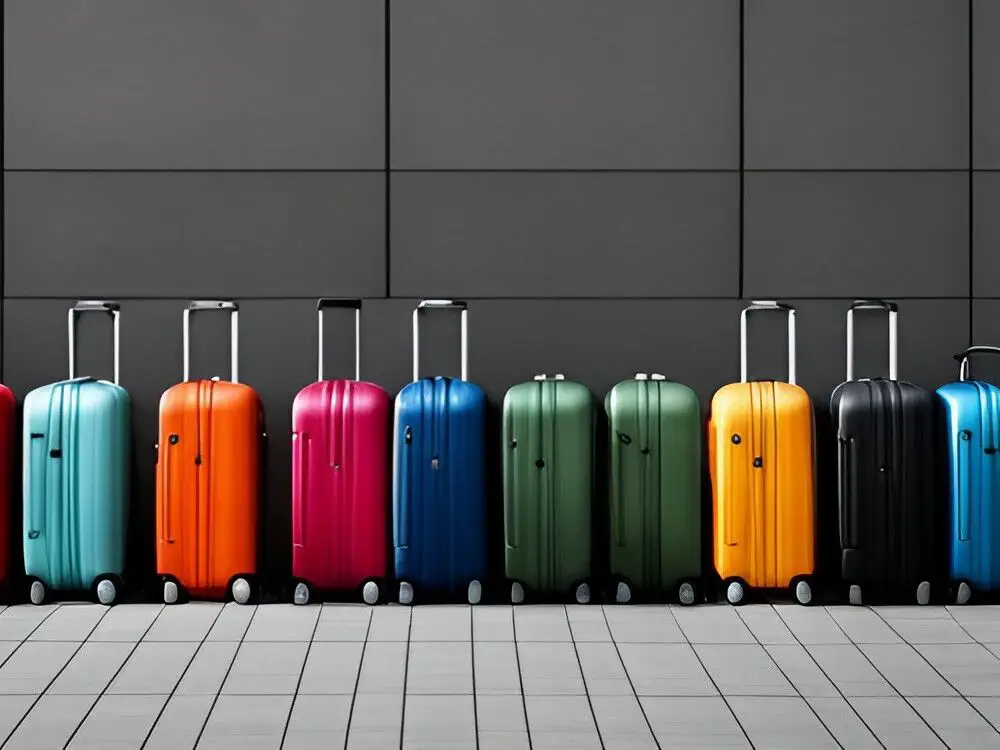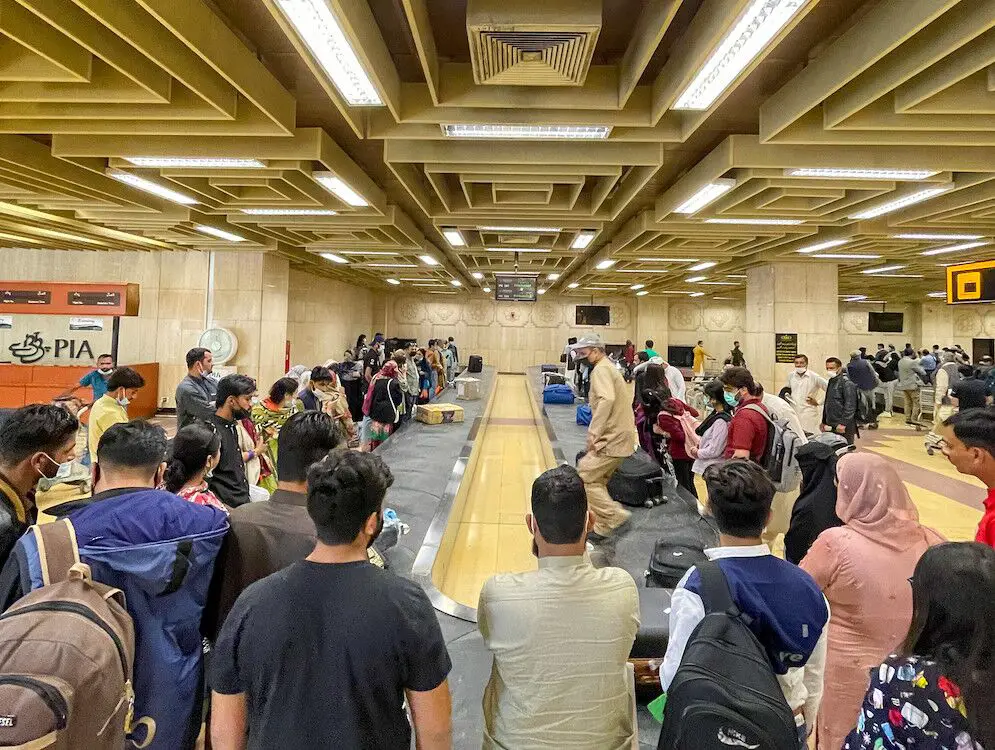When traveling internationally, you might need a connecting flight to reach your final destination. This can be confusing, especially for baggage check-in.
Do you have to re-check bags on a connecting international flight? The answer is: it depends. Sometimes you will have to do that, sometimes you won’t. Here in this article, we’ll talk about all most popular scenarios. The common factor here is that you can get the answer by simply asking at the airline check-in counter. They know “how far they are checking in your baggage.”
Your airline can provide the best answer for your specific situation.
Did you miss a connecting flight? File a compensation claim online.

1. Do You Have to Recheck Bags on a Connecting International Flight?
Generally speaking, mostly you don’t have to recheck bags on a connecting international flight. Because it’s a connecting flight, and on connecting flights airline takes care of baggage transfer.
- You check in baggage once
- Airline takes your baggage to your final destination
That’s one of the main benefits of connecting flights, a thing everyone loves, when you compare connecting flights vs self-transfer flights.
We have several baggage guides on this website. You can check them out for more details on baggage transfer on connecting flights and self-transfer flights.
- Baggage on Connecting Flights
- Self-Transfer Flights Baggage Rules
- Is Baggage Included on Connecting Flights?
- Baggage Handling at Airports
- Delayed Baggage on Connecting Flights
- Lost Baggage on Connecting Flights
2. But It’s Not the Same Always…
The answer to the question of whether you have to recheck your bags on a connecting international flight depends on various factors such as airline, airport, and country. Here are some of the most popular scenarios:
2.1 Same Airline, Connecting Flight
If you are traveling on the same airline, and have two or more flights with the same airline, there is a high chance that you do not have to recheck your bags. This means that your bags will be tagged till the final destination, and you will be reunited with your luggage when you land at your destination.
Do you have to recheck baggage? Mostly no.
2.2 Codeshare Flights, Different Airlines, Connecting Flight
The same applies to codeshare flights.
This is when two or more airlines share a flight/sell the same flight. For example, you buy a connecting flight from Qatar Airways, but it’s partly operated by airBaltic (one out of two or three flights is operated by airBaltic).
Yes – you may have connecting flights with different airlines.
However, as long as these are connecting flights not self transfer, mostly you won’t have to recheck bags between the flights.
Do you have to recheck baggage? Mostly no.
2.3 Same Airline or Different Airlines, Self-Transfer Flights
If you are having a self-transfer flight, you will have to recheck your bags.
This is because these are different flights. Separate flights. You may have booked them separately or as a single booking, both options are possible. Sites like kiwi.com allow you to book several flights as one. Anyway, if it’s a self transfer, baggage transfer is your responsibility – you have to collect baggage after every one of your flights.
Do you have to recheck baggage? Yes.

3. Connecting Flights in the United States
If your connecting flight is in the United States, you may have to recheck your bags. This is because the United States Customs and Border Protection require all travelers to collect their bags and go through customs and immigration before checking their bags for their next flight, regardless of their final destination.
Indeed, even if the United States is not your final destination and you’re merely catching a connecting flight here, you’ll still have to follow the same Customs and Border Protection procedures. For example, if you’re traveling from London to Mexico with a connection in New York, you will need to collect your luggage upon arrival in New York, go through immigration, go through customs, and then re-check your bags for your onward flight to Mexico.
This rule is part of U.S. security measures and applies to all travelers, regardless of their ultimate destination. Therefore, always plan for extra time when your travel itinerary involves a connection in the United States.
This rule is part of U.S. security measures and applies to all travelers, regardless of their ultimate destination. Therefore, always plan for extra time when your travel itinerary involves a connection in the United States.
Do you have to recheck baggage? Yes.
4. Connecting Flights in Schengen Countries (European Union)
If you are making a connecting flight in Schengen countries, you do not have to recheck your bags. This is because Schengen countries have a mutual agreement that treats them as one country when it comes to baggage handling.
This means that your bags will be transferred directly to your final destination, and you won’t have to recheck them. That is – if it’s a connecting flight, not self transfer that you are taking.
Do you have to recheck baggage? Mostly no.
5. What Applies to You? Ask the Airline Staff at the Airport
While the scenarios described above can give you a general idea of what to expect, the most reliable way to know whether you need to recheck your bags during a connecting international flight is to ask airline staff at the check-in desk when you check in your luggage.
Airline staff are well-informed about the baggage policies and procedures of their respective airlines, and they can provide the most accurate information based on your specific travel itinerary. They will be able to tell you whether your bags will be checked through to your final destination or if you will need to collect and recheck them at some point during your journey.
Therefore, when you arrive at the airport, make sure to ask the airline staff at the check-in desk about your baggage situation.

Baggage on Connecting International Flights: FAQ
1. Do I Have to Collect My Checked Bag for a Connecting Domestic Flight When Traveling Internationally?
Yes, in most cases, you will need to collect your checked bags and recheck them onto your connecting domestic flight.
This is especially true if you’re transiting through a country where you have to go through customs and immigration, such as the United States. But it’s also true in many more countries. In some countries you will also have to change airport, or at least a terminal, to fly further domestically.
2. Can I Check My Bags All the Way to My Final Destination if I’m Flying with Different Airlines?
This depends on whether the two airlines have an interline agreement.
If they do, you can usually check your bags all the way to your final destination. However, it’s always best to check with your airlines to confirm.
3. What Happens if I Miss the Baggage Recheck Deadline Due to a Delayed Flight?
In such a case, the airline will typically put your bags on the next available flight to your final destination. That is, if you are going to make it for the flight.
If you miss a recheck deadline, there’s a high chance you will miss your connecting flight. And, in this case, you’ll have to take a later flight, and your baggage will be put on the same flight.
No matter the scenario, go and talk with the airline staff at the airport.
4. Do I Need to Pay for Baggage Recheck on a Connecting Flight?
Typically, the baggage fees you pay when you first check your bags cover the entire journey, including any connecting flights.
5. What Should I Do if My Checked Bag Doesn’t Arrive at My Final Destination?
If your checked bag doesn’t arrive at your final destination, you should report it at the airport immediately. Most airports have a lost baggage counter next to baggage carousels. You have to make a claim there.
6. What Should I Do If My Checked Baggage Is Damaged During My Journey?
If your checked baggage is damaged during your journey, report the damage to the airport’s baggage services office at the airport as soon as possible.
Provide a detailed description of the damage and any relevant details about your flight and baggage. The staff will guide you through their specific process for handling damaged baggage claims. It’s also recommended to take photos of the damage for your records.
7. How Is Oversized Baggage Handled on Connecting Flights?
When it comes to connecting flights, oversized baggage is usually handled in the same way as standard-sized baggage. However, due to their larger size, these items may require additional handling and may be subjected to additional fees. It’s crucial to check in oversized items early to ensure they are properly processed and loaded onto the flight.
If you’re traveling with oversized items, it’s always best to check with your airline in advance to understand their specific policies and procedures. This can help avoid any unexpected issues or costs during your journey.
About the author:
Kaspars is a digital nomad and travel blogger who’s been traveling the world extensively since 2013. Since 2017, Kaspars has been writing about the less-known aspects of air travel, things like air passenger rights laws and regulations. He’s really good at simplifying complex concepts and making them easily understandable. Kaspars favorite airlines are Qatar Airways and Turkish Airlines.
